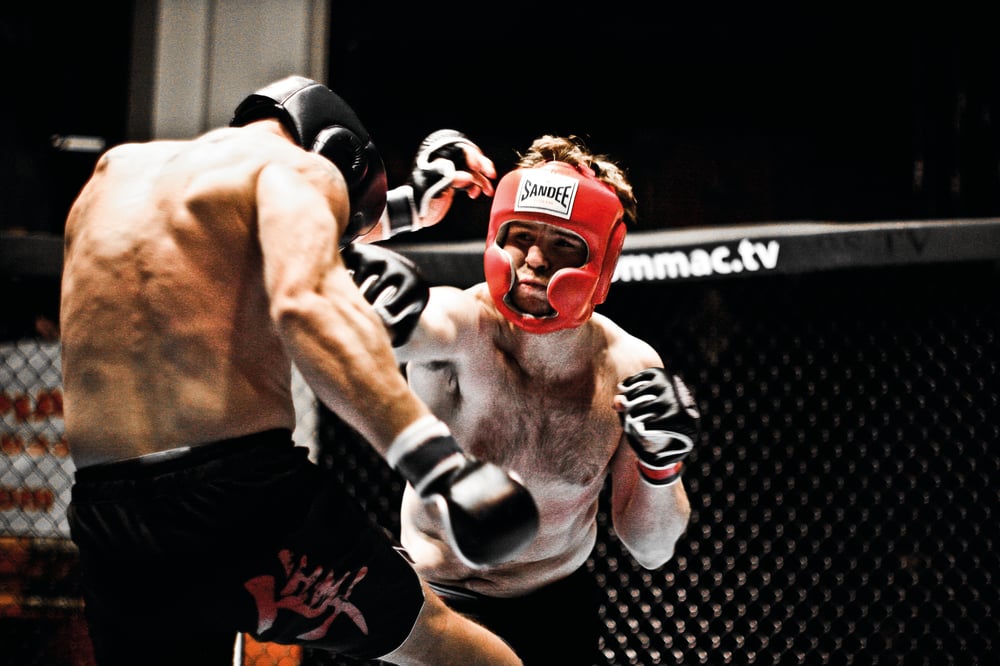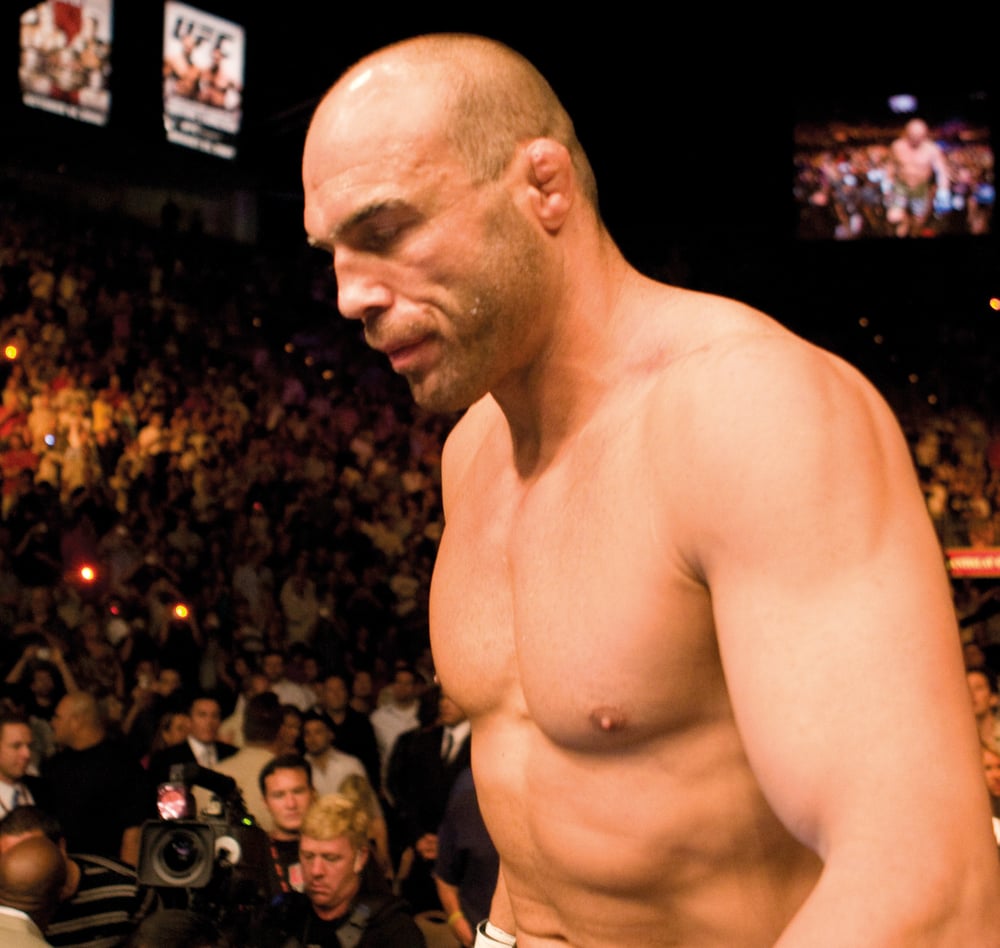
Issue 062
May 2010
It is a question that sparks great debate among MMA fans. Should MMA become an Olympic sport?
A lot of fans love the idea, while others would hate to see their sport hobbled by overly restrictive rules. Many think the idea so unrealistic that it is not even worth considering, but then there are the calculating optimists, the dreamers of a future where the world will be finally ready for introducing MMA as an Olympic sport.
They see rash guards emblazoned with the colors of their national flag, they see five circular cages set out in the Olympic rings pattern, filled with fighters all aiming for Olympic gold. Is there a middle ground between satisfying Olympic event criteria and maintaining the integrity of our sport?
What about tournament injuries, striking rules and the issue of using protective equipment? MMA can be confusing enough for new viewers without them trying to understand what could amount to two armored Power Rangers rolling around in knots seemingly trying to morph into ‘MMA Ultra Ranger’.
Current legislation issues do show that the tide is turning. Cities, states and countries are changing their position on MMA. This may be a long-term goal, but if vocal support is given there will come a time when the Olympic doors begin to open. Promoters would be able to use the games as a showcase for future stars from around the world, with fans enjoying the worldwide Olympic coverage to scream support for their country, while choosing to bet on Brazil.
Three of the sports leading figures weigh in with their views on whether MMA could make it into the Olympics.
Mario Yamasaki: UFC referee
“I would love to see MMA in the Olympics. You know, the IOC have very strict rules and regulations; if we follow that, it might happen. I come from a traditional Olympic family and we’ve been involved for a long time; there are lots of politics.”
Bruce Buffer: Voice of the Octagon
“I’d love to see it happen and would love to be there to announce or commentate on it if I was invited. It would be an amazing experience to be part of an Olympic event, but if it ever is [a reality] it will probably be without elbows and knees. There would definitely be protective gear if it got in the Olympics, I’m sure. I think the chances are good, as if you combine taekwondo, wrestling and boxing – all of which they have now – you pretty much are already there with an MMA Olympic event.”
Dana White: President of the UFC
“It would be a huge benefit to us if mixed martial arts became an Olympic sport. It would create instant awareness around the world, and it would be huge. I would support it 100%. I personally am not out there trying to get mixed martial arts as an Olympic sport – I got enough to do, somebody else can figure that out – but if it popped and they said, ‘Yes, we’re thinking about it,’ I would go guns-a-blazing and
try to make it happen. It would change the game forever.”
We spoke with a number of experts and industry insiders to see if the Olympic dream is alive and well, or nothing more than a far-fetched fantasy.
Marc Goddard: Former fighter. Marc now wears many hats. A referee who has officiated main-event fights for the UFC, Marc was the first British referee to be licensed in the USA. He also coaches up-and-comers and promotes amateur events.
Bas Rutten: A former king of Pancrase and the only Dutch fighter to win a UFC world title, Bas is a lifelong martial artist with a background in taekwondo and Muay Thai. Bas started competing in MMA in 1993.
Doc Hamilton: A judge and referee with over 20 years of experience, Nelson ‘Doc’ Hamilton is one of MMA’s most highly regarded officials. He heads up REFS (www.mmarefs.com), an instructional and consulting organization.
Stephen Quadros: Pundit, broadcaster, actor, trainer and more, ‘The Fight Professor’ brings an analytical approach to matters and is considered one of the most knowledgeable figures in MMA.

Would you like to see MMA in the Olympics, and what do you think are the chances of it ever happening?
Goddard: I think that the purists among us would like to see it as a way of acceptance, further legitimizing the sport. From a commercial / growth aspect I am not so sure. Of course there is an immediate comparison / crossover with so many established sports and disciplines like boxing, wrestling, judo, etc. I am on the fence with this one at the moment!
Rutten: Problem is that not many countries are doing MMA right now. Think about it, how many? Once people see that it’s a mix of four Olympic sports then hopefully they realize that it’s not as bad as it sounds. If people see that it is a thinking-man’s sport, then it will be OK. It’s gonna take a while.
Hamilton: I have mixed feelings about MMA in the Olympics. On the one hand, international exposure would certainly help to both popularize and legitimize the sport, however, I would hate to see it emasculated and reconfigured as has been done to boxing and taekwondo.
Quadros: I’d love to see MMA accepted in the Olympics. It would create a legitimate platform for amateur competition. Once this happens the quality of athleticism will go through the roof. MMA is a combination of wrestling, judo, boxing and taekwondo, all of which are accepted Olympic sports. MMA has a history of being in the Olympics in the form of pankration back in ancient times.
Do you think a team-based world MMA tournament is possible inside the two-week time span of the Olympic games?
Goddard: I would be unsure as to how this would pan out. Of course, there already are large team events that play out within the time span allowed. I think that the alternate list would need to be pretty comprehensive.
Rutten: Easy, if they can do it with wrestling, boxing, taekwondo and judo, they can also do it with MMA.
Hamilton: Yes, if we’re talking about MMA teams along the lines of a national boxing, wrestling, or judo team.
Quadros: The structure of a tournament would be a problem. The main problem would be the possibility of injury due to having to fight numerous times over the course of the games. The goal of an MMA fight is to stop your opponent, either by submission or knockout; there is a high likelihood of injury. The solution is to have several fighters on each team in the same weight division.
Would protective equipment and larger sparring gloves be realistic measures to cut down on injuries?
Goddard: o definitely not – as for the gloves, it inflames the argument that the bigger the glove the bigger the accumulative concussive nature of the strikes becomes. Maybe more along the lines of amateur MMA rule sets, i.e. removing elbows and heel hooks and the likes would have a far greater impact on injuries related to MMA.
Rutten: No, maybe very tight shin-protection that also goes a little over the instep of your foot, but the same gloves. Of course no head gear, but that could be the reason that they want to stop it. The boxing commission will try that for sure.
Hamilton: Possibly, but therein lies the problem. As MMA is a hybrid sport, protective equipment to minimize injuries from striking would likely prove to be counterproductive for grappling. Quite likely the scoring criteria would be altered, probably resulting in a scoring system akin to that of boxing and taekwondo.
Quadros: Athlete safety is paramount but you don’t want to de-fang or de-claw the core of what the game is. Headgear and / or body protectors, like in taekwondo competition, would be a challenge because of the wrestling and grappling elements in MMA, especially when wearing gloves. Shin guards could be worn as well.
Should Olympic fighters be amateur status or professional MMA stars?
Goddard: If it happened then who knows, remember the USA basketball team? Obviously countries like Russia, Brazil, Japan and the USA would have huge depth in numbers for their strongest possible teams. I think that restricting it to amateur competitors, in line with boxing, would give a truer representation and a more level
playing field.
Rutten: Amateur, the big organizations would NEVER let their champions fight. It would be a dream come true for the fans though. Let’s not forget that the fighters don’t get paid. That wouldn’t be a problem for me, I would fight for free – I mean, in the Olympics? How cool is that? No money needed!
Hamilton: Ideally, I prefer that the Olympic competitors remain amateur. However, I think the point is moot, given the fact that the IOC has decided that professional competitors (basketball, hockey, tennis, soccer) are not only permissible but desirable.
Quadros: No, fighters who are professionals should not be allowed in Olympic MMA competition. Olympic MMA competition should only be for amateurs, like with boxing. It wouldn’t be fair for GSP, Fedor Emelianenko, Shinya Aoki, BJ Penn and Anderson Silva to compete against amateurs!

Which MMA legends in your opinion would make good Olympic team coaches for their respective countries?
Goddard: The immediate ones that spring to mind are Couture, the Gracies, Yoshida, Fedor, etc. Maybe this would be the kind of thing to get our own homegrown Olympic world-class sports stars crossing over into MMA on the coaching front – Neil Adams and Joe Calzaghe as two perfect examples.
Rutten: Randy Couture; although not a ‘legend’ but a very good trainer, Greg Jackson; Tito; I really liked Rashad in TUF. What about Bas Rutten for the US? I am a citizen! [Laughs] Martijn de Jong for Holland, Gokor Chivichian for Armenia, Sakuraba for Japan, Fedor for Russia, those pop up right now.
Hamilton: It’s my observation that most sports legends are seldom the best coaches. Outstanding coaches such as Renzo Gracie, Greg Jackson, Pat Miletich and Erik Paulson make the best coaches. If I had to choose a ‘legend’, I would look at successful competitors who are also students of the game: Josh Barnett, Randy Couture, Fedor and ‘Minotauro’.
Quadros: In reality, most famous fighters wouldn’t be as effective at coaching as, say, Greg Jackson, Cesar Gracie or Crazy Bob Cook, three men who are famous for their coaching first and foremost. Put it this way, if you wanted to be a boxer, who would you rather have as a coach: Mike Tyson or Freddie Roach?
What benefits would Olympic MMA bring to the sport of MMA in general?
Goddard: I think that the greatest benefit we would see would be the acceptance and recognition of the sport of MMA. It would also act as a potential breeding ground for the stars of tomorrow.
Rutten: Are you kidding? It would be huge! Everybody will realize how really cool, exciting and technical it is. People will start rooting for the fighters from their country and those guys hopefully will have a professional career after that.
Hamilton: Aside from worldwide exposure and possibly additional credibility, I can’t think of any additional benefits. Additionally, I believe that those benefits will be realized only if the sport presented bears some resemblance to what we presently know as MMA.
Quadros: The sport is big now, but with Olympic participation another positive effect would be that the level of athleticism would become substantially better very quickly. Ten years from now we would look at videos of fighters who competed in today’s professional events and they would seem primitive. The acceleration of the sport’s evolution would be staggering.
...









